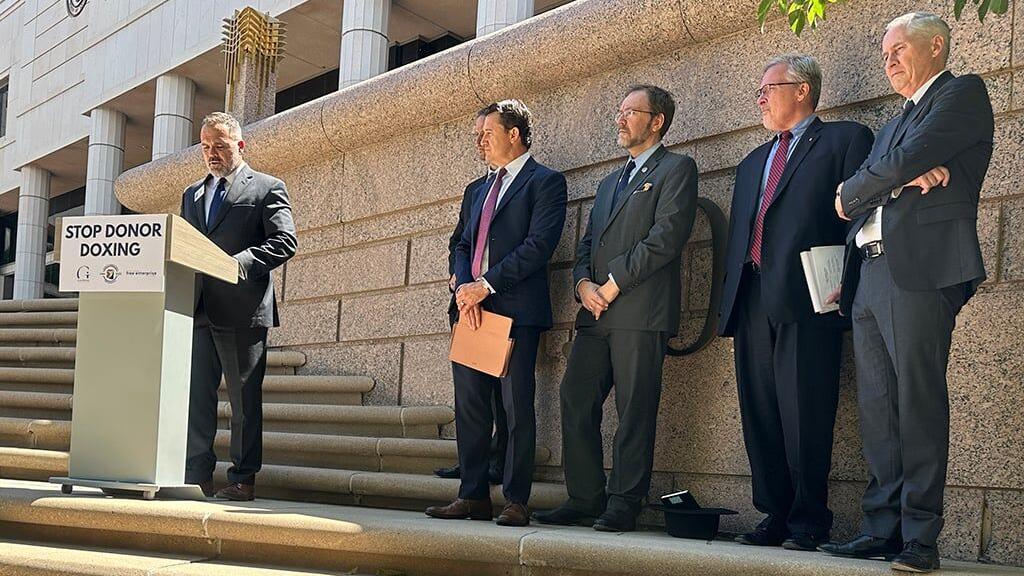Gabrielle Wallace
Cronkite News
PHOENIX — The fate of Proposition 211, an overwhelmingly popular law passed in 2022, has been placed in the hands of the Arizona Supreme Court.
The justices on Thursday heard arguments from the Goldwater Institute, the plaintiff, and from the Arizona secretary of state, whose office defended the proposition.
Proposition 211, popularly known as the “Voter’s Right to Know Act,” passed with 72% of the vote. The Goldwater Institute, a public policy research organization, filed a lawsuit challenging the proposition in December 2022, asserting that it infringed on free speech and privacy rights.
“The unfortunate reality is that this law simply does not allow that speech to occur. It does not allow space for expression in this state,” said Jon Riches, the vice president for litigation and general counsel at the Goldwater Institute.
People are also reading…
The law requires major statewide campaign donors to disclose where the money came from. Any entity spending at least $50,000 on campaign media has to identify its donors who gave at least $5,000. In local elections, the disclosure threshold is $25,000.
Campaign media spending refers to money spent in support or opposition of a candidate through television, digital media, print, radio or other similar advertisements.
The Goldwater Institute called the proposition “donor doxing” — publishing private information with malicious intent. The Arizona Secretary of State’s Office, the defendant in the case, disagreed with that characterization, and said the law calls for transparency.
The Goldwater Institute said that it worries for donors whose information is made public, such as their address and employer. Other opponents of the law argued that the information gives ammunition to the opposition, who might be unhappy, and puts a target on the backs of donors.
“They’re afraid of the activist organizations out there, they’re afraid of politicians and others that want to exact retaliation because they simply support a position or belief that they disagree,” said Scot Mussi, the president and executive director of the Arizona Free Enterprise Club.
Former Arizona Attorney General Terry Goddard, the driving force behind the law’s passing, said the transparency is necessary for informed voting.
“It’s a way to allow the voters to have the chance to know who it is that’s trying to persuade him one way or the other,” Goddard said. “And without that information, you just can’t cast a knowledgeable vote.”
Goddard said the proposition and the sentiment behind it are important countrywide, especially in Arizona, after a “dark money” scandal in 2014.
Dark money refers to the money that moves from one donor to another entity and then finally to a campaign. The entity that actually donates the money to campaigns takes the original donor out of the equation.
In 2014, Arizona Public Service, a power company, donated more than $10 million to various groups supporting two Arizona Republicans running for Arizona Corporation Commission positions. Both Republicans won their races and later supported an APS request to increase electric bills in the state.
The Arizona Supreme Court is deliberating the arguments, and a resolution is not expected anytime soon. Both sides said they felt confident after the arguments, and remained hopeful that the ruling would go their way.
Andrew Gould, a former Arizona Supreme Court justice, represented the Goldwater Institute during the oral arguments on Thursday. He – along with other Goldwater Institute staff – focused on the infringement of free speech.
“What this law does is it takes people who want to anonymously express themselves through organizations that will speak on their behalf,” Gould said. “It denies them that way. It strips them of that anonymity, and it exposes them to retaliation in every form,”
But Eric Fraser, representing the Arizona Secretary of State’s Office, disagreed. He said free speech and donations are not the same thing.
“The donor is not speaking, donor is not writing, donor is not publishing,” he said, comparing donations to speech.
Goddard echoed the sentiment.
“It’s no infringement on free speech,” he said. “It’s an effort to make sure that voters have all the information they need to cast a knowledgeable vote. And I think that’s our fundamental obligation, is to make sure that people feel confidence that they’re making the right decision.”
Get Government & Politics updates in your inbox!
Stay up-to-date on the latest in local and national government and political topics with our newsletter.
